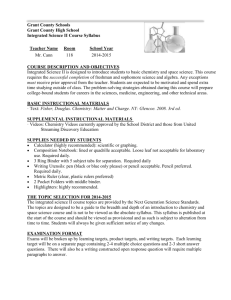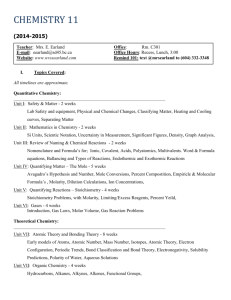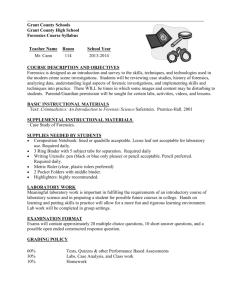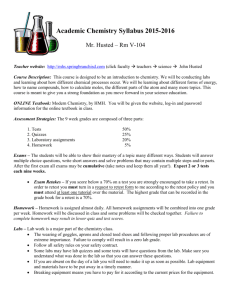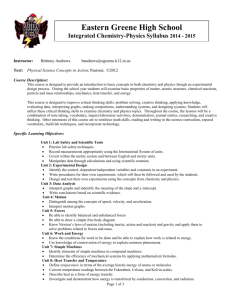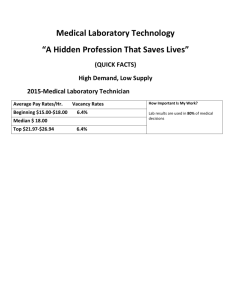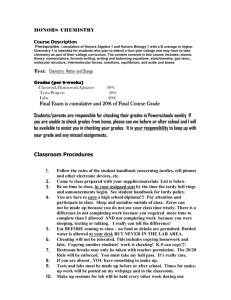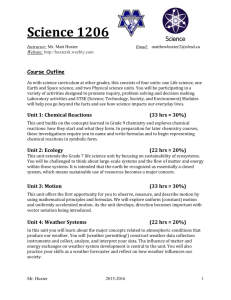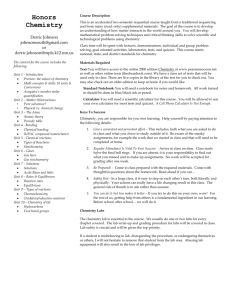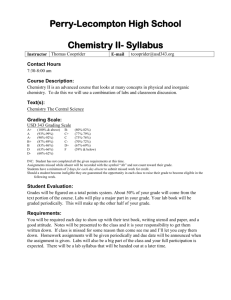Honors Chemistry Syllabus
advertisement
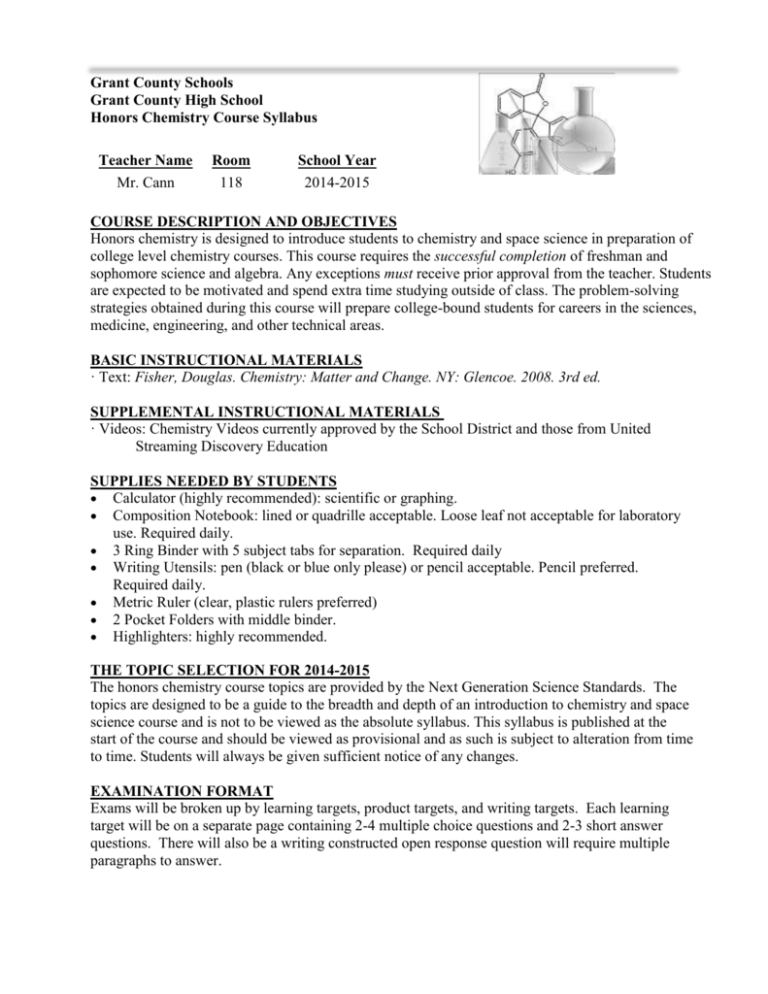
Grant County Schools Grant County High School Honors Chemistry Course Syllabus Teacher Name Mr. Cann Room 118 School Year 2014-2015 COURSE DESCRIPTION AND OBJECTIVES Honors chemistry is designed to introduce students to chemistry and space science in preparation of college level chemistry courses. This course requires the successful completion of freshman and sophomore science and algebra. Any exceptions must receive prior approval from the teacher. Students are expected to be motivated and spend extra time studying outside of class. The problem-solving strategies obtained during this course will prepare college-bound students for careers in the sciences, medicine, engineering, and other technical areas. BASIC INSTRUCTIONAL MATERIALS · Text: Fisher, Douglas. Chemistry: Matter and Change. NY: Glencoe. 2008. 3rd ed. SUPPLEMENTAL INSTRUCTIONAL MATERIALS · Videos: Chemistry Videos currently approved by the School District and those from United Streaming Discovery Education SUPPLIES NEEDED BY STUDENTS Calculator (highly recommended): scientific or graphing. Composition Notebook: lined or quadrille acceptable. Loose leaf not acceptable for laboratory use. Required daily. 3 Ring Binder with 5 subject tabs for separation. Required daily Writing Utensils: pen (black or blue only please) or pencil acceptable. Pencil preferred. Required daily. Metric Ruler (clear, plastic rulers preferred) 2 Pocket Folders with middle binder. Highlighters: highly recommended. THE TOPIC SELECTION FOR 2014-2015 The honors chemistry course topics are provided by the Next Generation Science Standards. The topics are designed to be a guide to the breadth and depth of an introduction to chemistry and space science course and is not to be viewed as the absolute syllabus. This syllabus is published at the start of the course and should be viewed as provisional and as such is subject to alteration from time to time. Students will always be given sufficient notice of any changes. EXAMINATION FORMAT Exams will be broken up by learning targets, product targets, and writing targets. Each learning target will be on a separate page containing 2-4 multiple choice questions and 2-3 short answer questions. There will also be a writing constructed open response question will require multiple paragraphs to answer. GRADING POLICY Grade Distribution 92.5 –100.0 % A 84.5 – 92.4 % B 74.5 - 84.4 % C 67.5 – 74.4 % D < 67.5 % F Grade book Set Up 100% Assessments Standards based grading PACING OF HONORS CHEMISTRY Units Introduction to Class 1-2 weeks Unit 2: Space Science 3-4 weeks Unit 3: Electromagnetism 2-3 weeks Unit 4 Chemical Bonding and Reactions 3 weeks Unit 5: Kinetics and Thermodynamics 2-3 weeks Assessment Learning Targets Students will be able to … Lab Safety, expectations Differentiate between precision and accuracy Use conversion factors to translate data to metric system and created derived units as necessary Make inferences to main ideas in a text and use evidence to support a claim Combine or compare two or more sets of data presentations to interpolate or extrapolate data Construct an explanation of the Big Bang Theory using scientific evidence that supports the theory Create a model of the star life cycle and determine the relationship between size, temperature, mass, luminosity, and lifetime of stars. Explain how elements on Earth are formed in stars and how matter/elements are distributed throughout the universe. Model and compare the processes of nuclear fusion, fission, and decay. Compare and contrast elements, compounds, and different mixtures. Summarize processes to separate mixtures. Compare and contrast early atomic theories in multiple ways. Describe an electron emission as either a particle or a wave and explain which can be useful in different applications. Calculate wavelength, frequency, and energy of a wave to show properties of a photon. Investigate periodic trends of atomic radius, reactivity, electronegativity, and oxidation. Evaluate and explain the organization and trends of the periodic table. Interpolate data points to identify a simple mathematical relationship between data and trends. Explain how atoms lose or gain electrons in order to obey the octet rule by forming ions. Determine chemical formulas and names of basic ionic and covalent compounds. Determine and apply physical properties of basic ionic and covalent compounds. Make inferences to main ideas in a text and use evidence to support a claim Combine or compare two or more sets of data presentations to interpolate or extrapolate data Create models to show energy conservations during different reactions. Create mathematical relationships showing the movement of energy through a chemical reaction. Create models showing chemical particles and how they move and change in a chemical reaction. Predict outcomes of reactions and how to manipulate reactions. CLASS ASSESSMENTS · Students will receive assessments in the form of quizzes, tests, projects, lab write-ups, etc. · Unit tests are usually given after the completion of a chapter in the textbook, but the tests may include information from more than one chapter. · Students will complete daily learning targets or objectives that are Next Generation Science Standards based. Students may reattempt assessments if necessary to reach a satisfactory grade, but all unit objectives must be complete prior to unit assessment. · In addition to the above described assessments, a comprehensive final exam will be administered at the close of each semester. LABS · Labs provide students with hands-on learning that promote scientific inquiry and can be very enjoyable. The scientific community is dependent on collaboration between peers. To this end, you will be working with at least one lab partner as you gather data in the laboratory. You will also find it very useful to work together after the lab has been completed. · I will not tolerate any inappropriate behavior in the lab. · Behavior that endangers the safety of others will not be tolerated. · Intentional damage to equipment will result in disciplinary referrals. · Lab safety will be reviewed at the beginning of the year. Students will be required to sign a safety contract that must also be endorsed by their guardians. · Serious violations or repeat offenses in the lab may result in a zero for all labs for the remainder of the quarter or semester as the teacher deems appropriate. · Most labs can be made up upon return. Some labs, however, cannot be made up if you are absent. If this is the case, you will receive an alternate assignment that you must do in order to receive an excused grade for a lab. · Students will be given time to type most lab reports in the computer lab. Although typing is not a requirement, it will be highly recommended. HOMEWORK POLICY · Homework is a constructive tool in the learning process when geared to the needs and abilities of students. Purposeful assignments not only enhance student achievement but also develop selfdiscipline and associated good working habits. Homework provided will be planned and organized; will be purposeful to the students; and will be evaluated and returned to students in a timely manner. Successful homework completion and study will enable students to master chemical principles and to develop powerful problem-solving skills. MAKE UP POLICY Illness/Unforeseen Event · If you are absent due to illness or some other unforeseen event, you will receive an opportunity to make up missing work, however appropriate due dates will be assigned. · If you are sick for more than three days, you should call the school and get a homework request from all of your teachers. · You must talk with me the day of your return in order to receive your missing assignments. · Tests or quizzes missed while absent must be made up within 2 days after your return. · If you miss an assignment that is based upon classroom participation, you might not be able to make this up. If this is the case, please talk to me about it. RETAKE POLICY · Students may retake tests or quizzes but must be completed outside of class time (before school, after school, enrichment, etc.). You will receive an alternate assessment that tests the same concepts. Questions may or may not be used from the original test. HALL PASSES · It is recommended that you leave the room only in dire emergencies. There will be a check in and checkout procedure each and every time you need to leave class and students are only permitted to be out of class for 5 minutes. Students are not to leave class the first ten or last ten minutes of class. TARDIES · Tardiness is an undesirable behavior in all academic settings. Students are expected to be in the classroom before the bell rings and ready to learn. · Consequences of being tardy may be the forfeiture of taking a quiz or receiving other assignments given at the beginning of class. · Being tardy three times will result in disciplinary referral to administration. TECHNOLOGY · If emergencies exist, please contact the school office, not individual cell phones. Students may be allowed to call home from the classroom phone. See school policy. · Use of cell phones, tablets, computers and laptops is subject to school policy and code of conduct. · Calculators are scientific/mathematics tools that can be very useful in the school setting. Games on calculators are, however, unacceptable. Repeat offenders will have their parents contacted. · If cell phones are used inappropriately in the classroom, I will ask to collect them and students will receive them at the end of the class period. If students refuse, an official referral will be immediately written and a call home to parents. DRESS CODE · I will strictly enforce the school dress code. LEARN IT! · Laboratory dress code will be strictly enforced during lab activities. (see lab rules and procedures) FOOD/DRINK · No food, gum, or candy is acceptable in the any science classroom. · Water bottles are acceptable in class, provided they have lids and are kept out of the way. · Absolutely NO food or drink is allowed during labs. This includes water bottles. TEACHER WEBSITE and INFINITE CAMPUS Completing homework assignments in a science class takes dedication and a sufficient amount of time. I have elected to use the teacher web sites provided on the Grant County High School web site as well as Infinite Campus. Students and parents can see what assignments are due and coming up. GETTING HELP · I have an afterschool and before school calendar of availability on my front classroom door. · I’m usually available a half-hour before and a half-hour after school most days. · I’m available often during my planning period, but this is not recommended. · I will conduct after school tutoring and help at least once a week (on Mondays). · If you cannot find me during these times, drop a note or write a message on the white board. TEACHER CONTACT INFORMATION Please try to contact me by any of the following means if you have any questions or unresolved issues. The best way to contact me is via email. · e-mail: justin.cann@grant.kyschools.us · webpage: http://www.grant.kyschools.us/CannJustin.aspx · phone (859) 824-9739 · Twitter: @CannJustin
